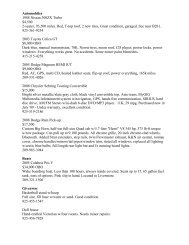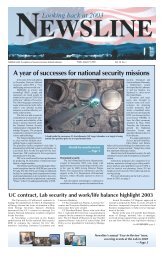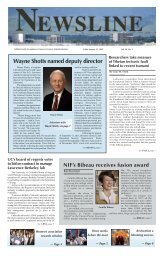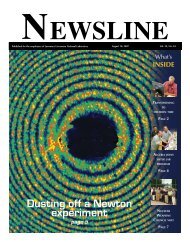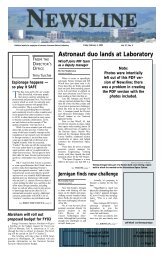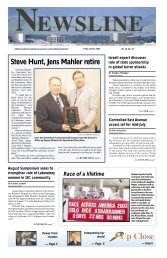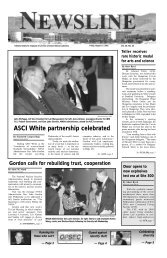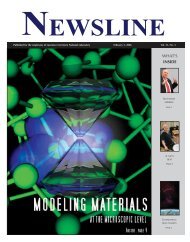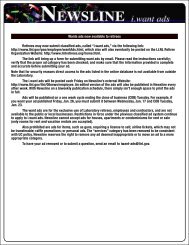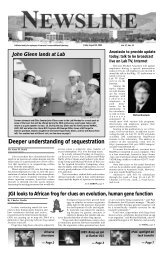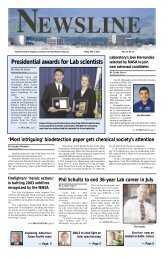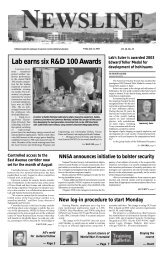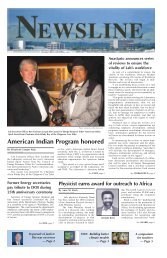New Laboratory counsel selected - NEWSLINE - Lawrence ...
New Laboratory counsel selected - NEWSLINE - Lawrence ...
New Laboratory counsel selected - NEWSLINE - Lawrence ...
Create successful ePaper yourself
Turn your PDF publications into a flip-book with our unique Google optimized e-Paper software.
Friday, June 10, 2005<br />
<strong>New</strong>sline 5<br />
Jim Wells steered the course of Lab’s training<br />
By Linda Lucchetti<br />
<strong>NEWSLINE</strong> STAFF WRITER<br />
When Lab Training Manager Jim<br />
Wells turns out the lights, closes the<br />
office door, and drives off to retirement<br />
in his RV later this month, he will have<br />
no regrets, nor will he be leaving any<br />
projects unfinished. As Wells sees it,<br />
“nothing is finished, but only in the state<br />
of continuous improvement.”<br />
With that philosophy, Wells can look<br />
back on his 33-year Lab career, and be<br />
satisfied with the changes he has engineered<br />
and the well deserved respect he<br />
has garnered from colleagues.<br />
In 1972, with an engineering degree<br />
in hand from the University of Arizona,<br />
Wells chose LLNL over four other<br />
potential employers, for what he anticipated<br />
would be a short-term position.<br />
“I thought I’d stay at the Lab for five<br />
or six years, and it would look good on<br />
my resume.” Wells admits. “But, after I<br />
got here and passed the magical ten-year<br />
mark, I stayed. Besides, the University<br />
of California is a good employer, and<br />
Lab management is good.”<br />
Among his many key roles, Wells<br />
may best be remembered and commended<br />
most for leading the Lab’s training<br />
organization into the next century, serving<br />
as primary architect for many new<br />
tools and improved processes. Wells<br />
worked in many positions within the<br />
engineering directorate, but made his<br />
mark in 1991 when then Associate<br />
Director Den Fisher tapped him to be the<br />
Lab’s first training manager.<br />
“Jim was uniquely qualified for the<br />
job. Not only did he have a strong training<br />
background, but he had an outstanding<br />
technical background that gave him<br />
the necessary perspective to ensure quality<br />
content and delivery,” Fisher remembers.<br />
The training manager position was<br />
one initiative that surfaced in the wake of<br />
numerous audits being conducted at the<br />
<strong>Laboratory</strong> during the early ‘90s — a<br />
time when many Lab employees will<br />
recall the term “Tiger Teams” as more<br />
than a reference to Detroit’s baseball<br />
players.<br />
Wells credits Lab management dur-<br />
Jim Wells<br />
LBL to host DOE Advanced Computational Software workshop<br />
BERKELEY, Calif. – Registration for the<br />
sixth annual workshop on the DOE Advanced<br />
CompuTational Software (ACTS) Collection<br />
(http://acts.nersc.gov) will close Saturday, June 25.<br />
The four-day ACTS Collection will provide<br />
hands-on instruction in building robust scientific<br />
and engineering high-end computing applications.<br />
The workshop will be held Aug. 23-26 at the U.S.<br />
Department of Energy’s <strong>Lawrence</strong> Berkeley<br />
National <strong>Laboratory</strong> in Berkeley, Calif. Complete<br />
information about the workshop can be found at <<br />
http://acts.nersc.gov/ events/Workshop 2005/<br />
announcement.html>.<br />
The four-day workshop will present an introduction<br />
to the ACTS Collection for application scientists<br />
whose research needs include either large<br />
amounts of computation, complex software integration,<br />
distributed computing, the use of robust<br />
numerical algorithms, or combinations of these.<br />
The workshop will include a range of tutorials on<br />
the tools (those currently available in the collection<br />
and some deliverables from the DOE SciDAC<br />
ISICs), discussion sessions aimed at solving specif-<br />
JACQUELINE MCBRIDE/<strong>NEWSLINE</strong><br />
ing that period for foresight and strategic<br />
planning that introduced many improvements.<br />
It was during these critical years that<br />
Wells laid the groundwork for developments<br />
that would change the way the <strong>Laboratory</strong><br />
implemented, managed and tracked employee<br />
training — one such foundation lie in the<br />
Lab’s training database-LTRAIN (Livermore<br />
Training Records and Information Network).<br />
“It’s hard to believe, but back in ‘91, there<br />
was no institutional training database. Back<br />
then, the Human Resources department maintained<br />
employee completion information, and<br />
that was about it. Soon after, LTRAIN’s primitive<br />
predecessor LROCC (Lab Repository of<br />
Completed Courses) was born and that<br />
became the official record keeper.” Wells<br />
recalled.<br />
LTRAIN enhanced LROCC, adding vital<br />
features such as a link to the course catalogue.<br />
Wells’ training organization was the first Lab<br />
group to actually draw from a live database<br />
for more efficient, real-time catalogue maintenance.<br />
Fisher notes that “Jim’s computer and<br />
organizational skills, plus his understanding<br />
of operational needs, enabled him to provide<br />
ic computational needs of the participants,<br />
and hands-on practice<br />
using the National Energy Research<br />
Supercomputing Center’s (NERSC)<br />
state-of-the-art computers.<br />
This workshop is open to computational<br />
scientists from industry<br />
and academia. Registration fees<br />
are fully sponsored by the DOE’s<br />
Office of Science. In addition,<br />
DOE will sponsor travel expenses<br />
for a limited number of graduate students and postdoctoral<br />
fellows. This support includes round-trip<br />
transportation to and from Berkeley, local transportation<br />
in Berkeley, lodging, breakfasts, lunches<br />
and workshop materials.<br />
The ACTS Collection comprises a set of tools<br />
mainly developed at DOE laboratories and proven<br />
in many applications and fields in computational<br />
sciences. These software tools aim to simplify the<br />
solution of common and important computational<br />
problems and have substantially benefited a wide<br />
range of scientific and industrial applications. Not<br />
essential web-based tools like LTRAIN<br />
for planning employee training.”<br />
In short, with many stops along the<br />
way, LTRAIN has grown into a multifaceted<br />
database capable of presenting<br />
course completions, course catalogue<br />
entries, training requirements, and course<br />
scheduling.<br />
Wells also managed the project<br />
that created the present-day, on-line<br />
Environmental, Safety and Health (ES&H)<br />
Manual. More than a decade ago, a diverse<br />
assortment of safety, health and environmental<br />
policies and procedures existed, but<br />
were not centrally located, let alone easy<br />
to reference. Under Wells’ direction,<br />
these documents were collected, analyzed<br />
and organized for consistency,<br />
maintenance and ease of reference.<br />
Today, managing the on-line document is<br />
still a huge, on-going, process but a success<br />
that has received notoriety across<br />
the DOE complex.<br />
What is the future of Lab training?<br />
Wells believes that the amount of required<br />
training will only increase. However there is<br />
good news. “Technology has made it easier<br />
for employees to get the training. We<br />
thought that CBT (computer-based training)<br />
was an answer, but now we have a<br />
better one — the Web component. It’s<br />
practical and in addition, it’s valuable as<br />
a reference tool for employees,” Wells<br />
states, acknowledging the Internet for<br />
many training enhancements.<br />
Wells has some advice for his successor.<br />
“Be honest, straight forward,<br />
and whenever tough questions come<br />
up, just ask, ‘What would be best for<br />
the institution?’ The answer will then<br />
come easier.”<br />
“I’ve had the opportunity to influence<br />
the way we help employees, with available<br />
training that helps them be safe. My<br />
philosophy has always been to leave<br />
every job in better shape than when started,<br />
and to make it better.”<br />
With that, Jim Wells, a man who capitalizes<br />
on continuous improvement<br />
rather than completions might just view<br />
his upcoming retirement in a similar<br />
fashion — not an end, not a conclusion,<br />
just a way to continually improve a good<br />
life.<br />
only have the ACTS tools been used<br />
to help applications run more efficiently<br />
in high performance computing<br />
environments, but they have<br />
also helped users achieve computations<br />
that would not have been possible<br />
otherwise.<br />
The format of this workshop is<br />
tailored to the computational problems<br />
and needs of its participants<br />
and the functionality available in<br />
the ACTS Collection. The number of participants is<br />
limited, and people interested in attending must fill<br />
out an on-line application form no later than<br />
Saturday, June 25. In addition, graduate students<br />
and postdoctoral fellows applying for travel support<br />
must provide a letter of support from their<br />
advisor or supervisor. This letter must also be submitted<br />
on-line and no later than the June 25 deadline.<br />
For more information on the workshop, please<br />
contact Tony Drummond at (510) 486-7624 or Osni<br />
Marques at (510) 486-5290.



